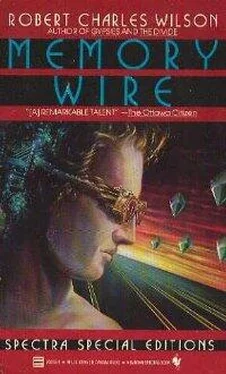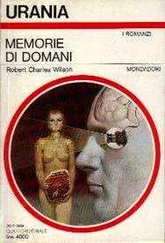Robert Wilson - Memory Wire
Здесь есть возможность читать онлайн «Robert Wilson - Memory Wire» весь текст электронной книги совершенно бесплатно (целиком полную версию без сокращений). В некоторых случаях можно слушать аудио, скачать через торрент в формате fb2 и присутствует краткое содержание. Год выпуска: 1987, ISBN: 1987, Издательство: Bantam Spectra, Жанр: Фантастика и фэнтези, на английском языке. Описание произведения, (предисловие) а так же отзывы посетителей доступны на портале библиотеки ЛибКат.
- Название:Memory Wire
- Автор:
- Издательство:Bantam Spectra
- Жанр:
- Год:1987
- ISBN:978-0-553-26853-9
- Рейтинг книги:4 / 5. Голосов: 1
-
Избранное:Добавить в избранное
- Отзывы:
-
Ваша оценка:
- 80
- 1
- 2
- 3
- 4
- 5
Memory Wire: краткое содержание, описание и аннотация
Предлагаем к чтению аннотацию, описание, краткое содержание или предисловие (зависит от того, что написал сам автор книги «Memory Wire»). Если вы не нашли необходимую информацию о книге — напишите в комментариях, мы постараемся отыскать её.
Memory Wire — читать онлайн бесплатно полную книгу (весь текст) целиком
Ниже представлен текст книги, разбитый по страницам. Система сохранения места последней прочитанной страницы, позволяет с удобством читать онлайн бесплатно книгу «Memory Wire», без необходимости каждый раз заново искать на чём Вы остановились. Поставьте закладку, и сможете в любой момент перейти на страницу, на которой закончили чтение.
Интервал:
Закладка:
She summoned up all her courage and, when she was certain Ruy was truly gone, knocked at the door of the shack.
The man who answered was old, thin, hollow-looking. He peered at her a long time—her mouth was too dry to speak—and said at last, “What the fuck do you want?”
“Pills,” she said, panicking.
“Pills! What makes you think I got pills?”
“Ruy,” she said desperately. “Ruy is my brother.”
His expression softened. “Well,” he said. “Ruy’s little sister cutting out the middleman.” He nodded. “Ruy’d be pissed off, I bet, if he knew you were here.”
“I can pay,” she said.
“Tell me what you want.”
She described the pink-and-yellow spansules.
“Yeah,” he said. “If that’s what you want. It’s a waste of money, though, you ask my opinion.” He rummaged in a drawer in an old desk at the back of his single precariously listing room; she watched from the doorway. “You might like these better.”
They were small black-coated pills in a paper envelope, maybe a hundred in all. Teresa regarded them dubiously. “Are they the same?”
“The same only more so. Not just pain pills, hm? Happy pills.”
Flustered, she gave him her money. It occurred to her during the long walk back that she might have made a fool’s bargain, the pills might be coated sugar. Or worse. That night, in bed, she was not sure whether she should try even one. What if they were toxic? What if she died?
But she had run out of Ruy’s spansules and she dared not pilfer more of Rosita’s. The need overcame her reluctance; she swallowed a black pill hastily.
Pleasure spread out from the pit of her stomach. It was, gradually and then overwhelmingly, everything she could have wanted: the satisfaction of a successful piece of artwork, the satisfaction that came from being loved, the satisfaction—this perhaps the best of all—that came from forgetting. Afloat on her mattress, rocking in the slow swell, she might have been the only person in the world. She loved the new pills, she thought. They were better. Yes. And one was enough. At least at first.
She lived happily with these arrangements for months, selling enough work to Mrs. Whitney to keep her supply up, idling through the days—she had begun to take a pill each morning too—as if they were hours. She felt she could have continued this way indefinitely if it were not for Ruy, who had been cheated out of his immense profit on the cheap pink-and-yellow spansules and who had discovered her arrangement with his supplier. He retaliated by leading Rosita to Teresa’s pill box, concealed behind a broken floorboard under the bed. Tia abuela Rosita was both angry and hurt, and made a demonstration of washing the pills down the Public Works conduit one by one. Teresa was so shocked to see her store of happiness flushed away that she displayed no emotion, merely packed her things, took what remained of her gallery money, and left.
(Years later she tried to return, with the idea of making some kind of apology to Rosita, achieving some sort of reconciliation … but the neighborhood had grown much worse, and her Guatemalan family had gone away. Just packed and left one day, an elderly neighbor told her, nobody knew where or what happened to them—except for that Ruy, of course. He had been killed in a knifefight.)
She put together a makeshift studio in the Floats off Long Beach, invested some money in supplies, acquired a new source for the small black pills. She learned that they were laboratory synthetics, synthetic enkephalins, very potent and very addictive. But that didn’t matter: she could handle it. She knew what she was doing. She began to meet other Float artists and understood that she was not alone, that many of them depended on chemical pleasures in one form or another. Some of them even used Exotic stones, the oneiroliths from the Brazilian mines. But that was different, she thought; too strange—not the thing she wanted.
She could not say exactly when her habit got out of hand. There was no border she crossed. It didn’t interfere with her work; strangely, the opposite was true. It was as if the thing inside her that created art was spurred on by her addiction—the way a dying tree will sometimes produce its most copious fruit.
She did sometimes, in her lucid moments, notice a kind of deterioration. She perceived this as a change, not in herself, but in her environment. Her studio was suddenly smaller: well, yes, she had moved into a cheaper one, saving rent. Her image in the mirror was gaunt: food economies, she thought, making her money go a little further. It proceeded in such gradual increments that nothing seemed to happen—nothing at all—until she was alone in a corner of an ancient bulk-oil terminal with a dirty mattress and a jar of medication. A jar of happiness.
She knew it was killing her. The idea that she was dying eased into her mind so cleverly that it seemed to appear wholly formed and yet familiar. Yes, she thought, I am dying. But maybe dying in a state of grace was better than living in a condition of unrelieved pain. Maybe it was a kind of bill come due at last: maybe, she thought, I should have died in the fire.
But anorexia and malnutrition had made her ill, there was physical pain in her knees and elbows, she was feverish much of the time. For relief she went back to the pink-and-yellow spansules—added them to her now almost exclusively chemical diet—and they helped for a time, but in time the pain reasserted itself. She would have welcomed death—her massively abused body cried out for it—but she could not bring herself to attempt suicide. It was as if she could sneak up on death but must not approach it directly; if she looked death in the face, some force inside her would recognize it, cry out in protest, pull her back from the brink. The frustration left her weeping.
She knew Byron Ostler vaguely: he was one of her dwindling circle of friends, not an artist but a dealer in dreamstones. In constant pain now, frightened of taking too many of the spansules, she reconsidered the idea of using an Exotic stone. It made visions, her artist friends said. Well, she did not want visions. She had had too much of vision. But visions, at least, might force out the demon of pain. It was worth a try.
She was careful to avoid seeing the pity in his face when she approached him. She held out the money in her hand. Only a very little of it remaining now. But he wouldn’t take it. Just blinked at her through his moon-shaped lenses, this ragged veteran in his threadbare fatigues, and gave her a stone. It was small and faintly blue and oddly shaped; when she took it from him, casually, it made her hand tingle. “Do it here,” he said.
“What?”
“As a favor to me,” he said. “Do it here.”
The visions were intense. She was only tranced out for a couple of hours, Byron said, but it seemed like infinities. She saw, like pieces of a mosaic, the distant world of the winged people. She danced like a whirlwind through history. Strangely, although there was much of misery in what she saw—and grief, and pain—she derived a certain strength from it. From the vigor of it, she thought: this river of life, twining in its endless double helix.
She saw, too—for the first time—the little girl who would occupy so many of her dreams.
The girl wore rags for clothes, athletic shoes bound with twine. “You have to look for me,” the girl said solemnly. “You have to find me.” And Teresa discovered that the imperative was there inside herself, and maybe had been all along… find her, yes.
Byron fired up his motor launch and took her back to the studio down south. Except it was not really a studio. She could see that now. It was a filthy corner of an abandoned warehouse. She looked at her jar of pills, appalled.
Читать дальшеИнтервал:
Закладка:
Похожие книги на «Memory Wire»
Представляем Вашему вниманию похожие книги на «Memory Wire» списком для выбора. Мы отобрали схожую по названию и смыслу литературу в надежде предоставить читателям больше вариантов отыскать новые, интересные, ещё непрочитанные произведения.
Обсуждение, отзывы о книге «Memory Wire» и просто собственные мнения читателей. Оставьте ваши комментарии, напишите, что Вы думаете о произведении, его смысле или главных героях. Укажите что конкретно понравилось, а что нет, и почему Вы так считаете.












